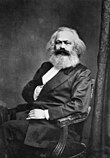
Back سلعة (ماركسية) Arabic Mercancía (marxismo) Spanish کالا (مارکسیسم) Persian Waar (marxisme) Dutch ਜਿਨਸ (ਮਾਰਕਸਵਾਦ) Punjabi Varuform Swedish Meta Turkish 商品经济 Chinese 商貨(馬學) ZH-CLASSICAL
| Part of a series on the |
| Marxian critique of political economy |
|---|
 |
In classical political economy and especially Karl Marx's critique of political economy, a commodity is any good or service ("products" or "activities")[1] produced by human labour[2] and offered as a product for general sale on the market.[3] Some other priced goods are also treated as commodities, e.g. human labor-power, works of art and natural resources, even though they may not be produced specifically for the market, or be non-reproducible goods. This problem was extensively debated by Adam Smith, David Ricardo, and Karl Rodbertus-Jagetzow, among others. Value and price are not equivalent terms in economics, and theorising the specific relationship of value to market price has been a challenge for both liberal and Marxist economists.
- ^ Karl Marx, "Outlines of the Critique of Political Economy" contained in the Collected Works of Karl Marx and Frederick Engels: Volume 28 (International Publishers: New York, 1986) p. 80.
- ^ Karl Marx, Capital: Volume I (International Publishers: New York, 1967) p. 38 and also "Capital" as contained in the Collected Works of Karl Marx and Frederick Engels: Volume 35, p. 48.
- ^ Karl Marx, Capital: Volume I, p. 36 and also in "Capital" as contained in the Collected Works of Karl Marx and Frederick Engels: Volume 35, p. 46.
© MMXXIII Rich X Search. We shall prevail. All rights reserved. Rich X Search